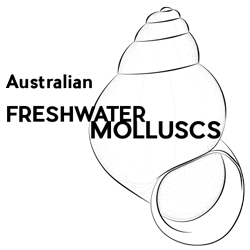
This species belongs to the Austropyrgus cooma group, whose members are characterised by generally pupiform to conical, small to medium-sized shells, where the last whorl and base are evenly convex.
A. grampianensis differs from other members of the group in the following combination of characters: shell small, with convex spire outline and convex whorls; aperture slightly disjunct; seminal receptacle at anterior edge of bursa copulatrix.
Austropyrgus grampianensis(Gabriel, 1939)
Class Gastropoda
Infraclass Caenogastropoda
Order Littorinida
Suborder Rissoidina
Superfamily Truncatelloidea
Family Tateidae
Genus Austropyrgus Cotton, 1942
Original name: Bythinella grampianensis Gabriel, 1939. In Gabriel, C. J. (1939). The freshwater Mollusca of Victoria. Memoirs of the National Museum of Victoria 11: 100–139.
Type locality: Near Silverband Falls, Grampians, Victoria.
In streams on water weeds, hard substrata (rocks etc.) and crawling on litter and sediment. Can be locally abundant. Assumed to feed by scraping bacteria and microalgae. Lay solitary capsules containing a single egg. Direct development.
This species is currently known from two small creeks in The Grampians, western Victoria.
Most species of Austropyrgus are geographically isolated and have restricted ranges, and this one is no exception.
Clark, S. A., Miller, A. C. & Ponder, W. F. (2003). Revision of the snail genus Austropyrgus (Gastropoda: Hydrobiidae): a morphostatic radiation of freshwater gastropods in southeastern Australia. Records of the Australian Museum 28: 1–109.
Gabriel, C. J. (1939). The freshwater Mollusca of Victoria. Memoirs of the National Museum of Victoria 11: 100-139.
Smith, B. J. & Kershaw, R. C. (1979). Field guide to the non-marine Molluscs of South-eastern Australia. Canberra, A.N.U. Press.